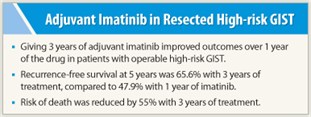A phase III trial presented at the ASCO 2011 Plenary Session could change the duration of adjuvant therapy for some patients with resected gastrointestinal stromal tumors (GIST).
 When imatinib treatment was extended to 3 years, compared with the standard 1 year, patients with high-risk GIST were 54% less likely to have a recurrence and 55% less likely to die within 5 years, according to results presented by Heikki Joensuu, MD, of Helsinki University Central Hospital in Finland.1
When imatinib treatment was extended to 3 years, compared with the standard 1 year, patients with high-risk GIST were 54% less likely to have a recurrence and 55% less likely to die within 5 years, according to results presented by Heikki Joensuu, MD, of Helsinki University Central Hospital in Finland.1
‘Compelling’ Data
“These data are pretty compelling,” Dr. Joensuu commented. “I would not be surprised if the standard will be 3 years of adjuvant imatinib in the near future.”
Mark G. Kris, MD, Chair of the ASCO Cancer Communications Committee, agreed. Moderating a press briefing, Dr. Kris said, “I think the entire oncology community was extremely excited when we saw that survival curve and those numbers at 5 years. It’s one of the amazing stories in oncology…. This is the kind of data that does change guidelines.”
SSGXVIII was an open-label phase III study that evaluated 36 vs 12 months of adjuvant imatinib at 400 mg daily after resection in 400 patients with GIST who were considered at high risk of recurrence by tumor size, mitosis count, or tumor rupture at surgery. The dose could be reduced for toxicity.
 At a median follow-up of 54 months, the intent-to-treat analysis found recurrences or death in 50 (25%) of 198 patients receiving 36 months of imatinib compared to 84 (42%) of 199 patients receiving 12 months of the drug. This yielded a recurrence-free survival rate of 86.6% at 3 years and 65.6% at 5 years, respectively, compared to 60.1% and 47.9% with 12 months of treatment (HR = 0.46; P < .0001), Dr. Joensuu reported.
At a median follow-up of 54 months, the intent-to-treat analysis found recurrences or death in 50 (25%) of 198 patients receiving 36 months of imatinib compared to 84 (42%) of 199 patients receiving 12 months of the drug. This yielded a recurrence-free survival rate of 86.6% at 3 years and 65.6% at 5 years, respectively, compared to 60.1% and 47.9% with 12 months of treatment (HR = 0.46; P < .0001), Dr. Joensuu reported.
“Resistance was not a big problem in the current study,” he observed.
The overall survival rate was 96.3% at 3 years and 92.0% at 5 years with 36 months of treatment, compared to 94.0% and 81.7%, respectively, with 12 months of imatinib (HR = 0.45; P = .019).
“Compared to 1 year of adjuvant imatinib, 3 years improves recurrence-free survival and overall survival as treatment for GIST patients who have a high estimated risk of recurrence after surgery,” he concluded.
Grade 3 or 4 adverse events were reported by 33% of the 36-month arm and 20% of the 12-month arm (P = .006); 26% and 13%, respectively, discontinued imatinib prior to GIST recurrence (P = .001). The most common events were anemia, periorbital edema, fatigue, nausea, and muscle cramps, all generally mild. ■
Financial Disclosure: Dr. Joensuu has received honoraria (paid to the Clinical Research Institute of Helsinki University Central Hospital) from Novartis for speaking and participation in advisory board meetings. Dr. Kris reported no potential conflicts of interest.
Reference
1. Joensuu H, Eriksson M, Hartmann J, et al: Twelve vs 36 months of adjuvant imatinib as treatment of operable GIST with a high risk of recurrence: Final results of a randomized trial (SSGXVIII/AIO). 2011 ASCO Annual Meeting. Abstract LBA1. Presented June 5, 2011.

 Charles D. Blanke, MD, Chief of Medical Oncology at the University of British Columbia in Vancouver, critiqued the SSGXVIII study, noting its “goals were reasonable and the methodologies for primary and secondary objectives were sound. The conclusion regarding recurrence-free survival is valid, as...
Charles D. Blanke, MD, Chief of Medical Oncology at the University of British Columbia in Vancouver, critiqued the SSGXVIII study, noting its “goals were reasonable and the methodologies for primary and secondary objectives were sound. The conclusion regarding recurrence-free survival is valid, as...